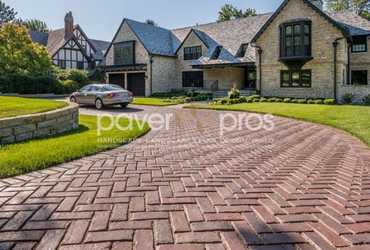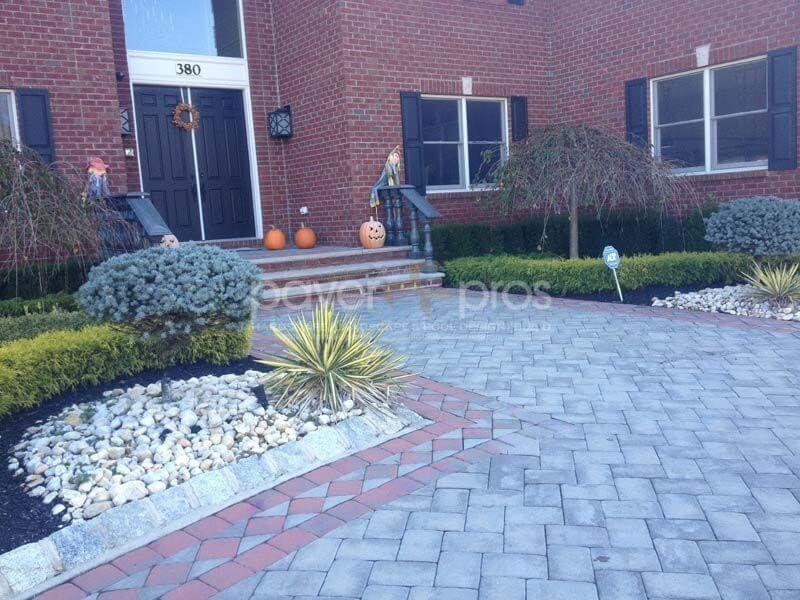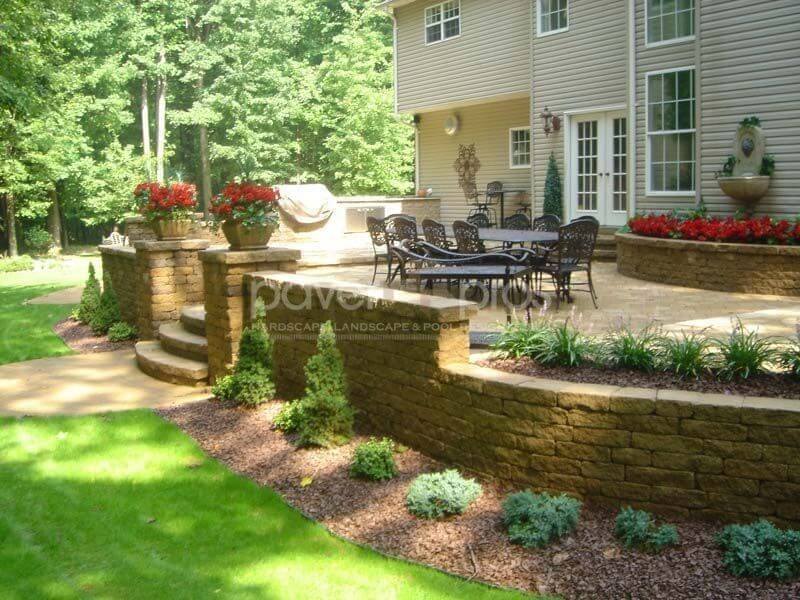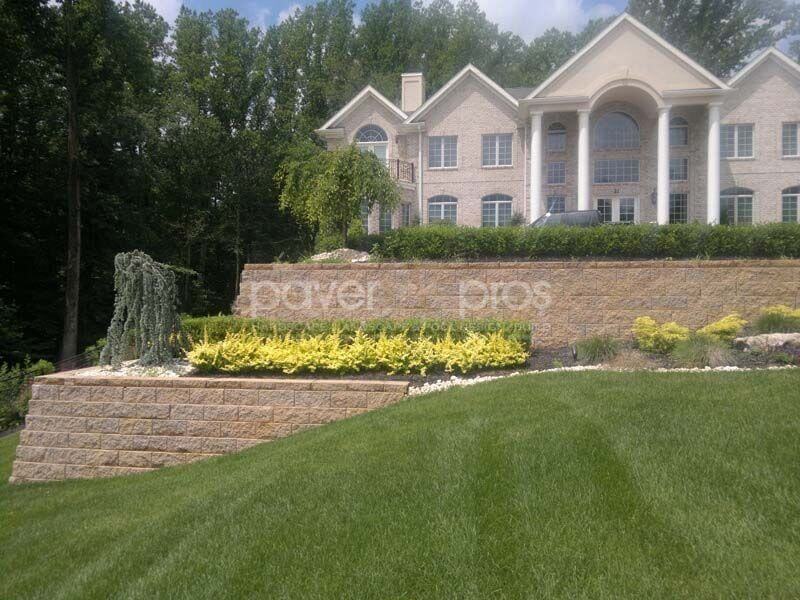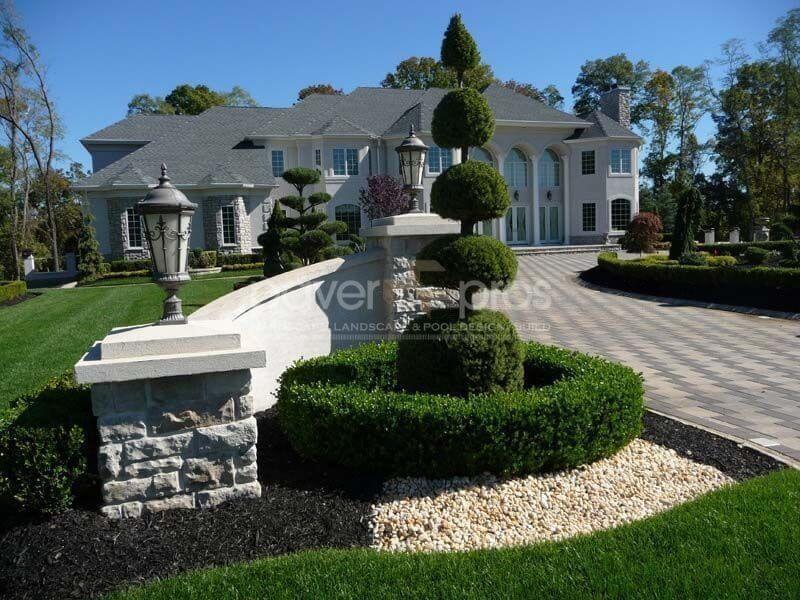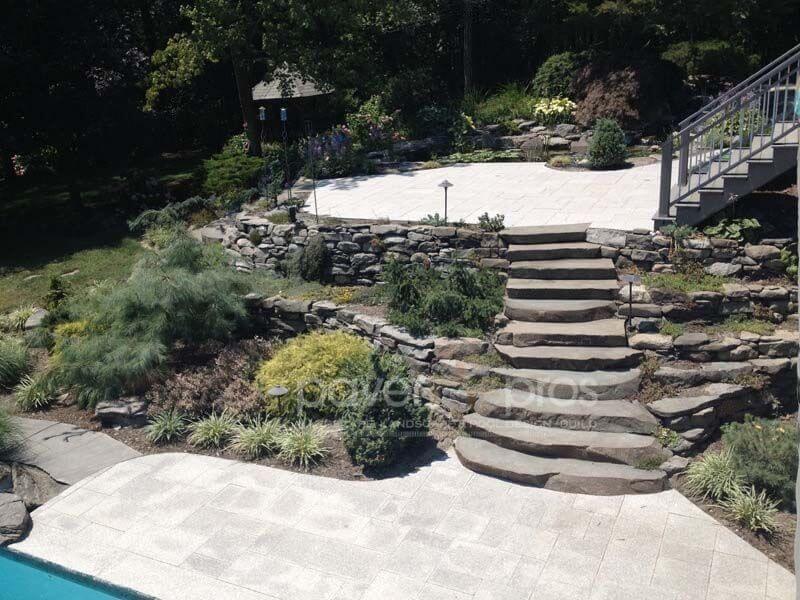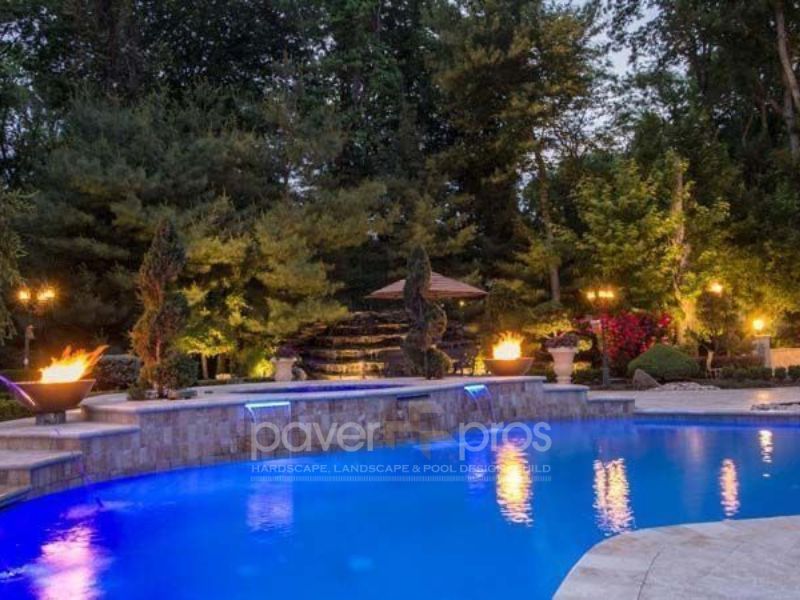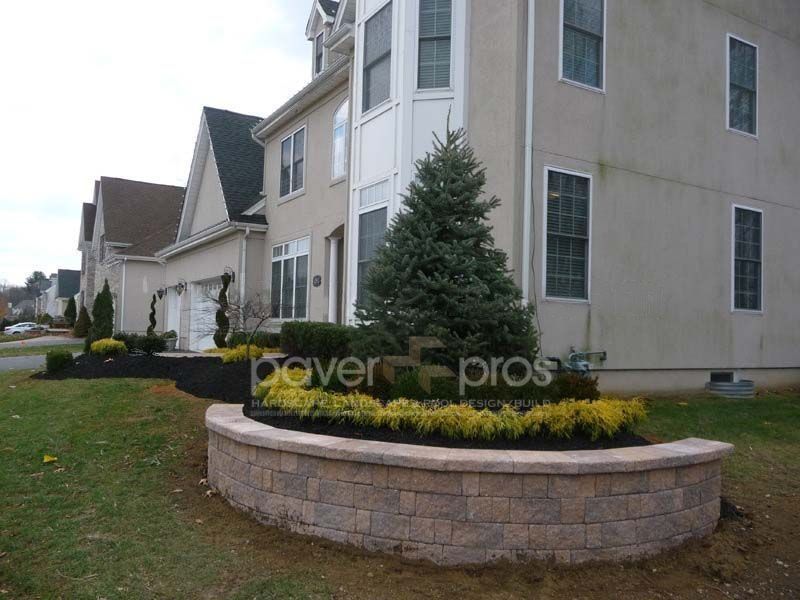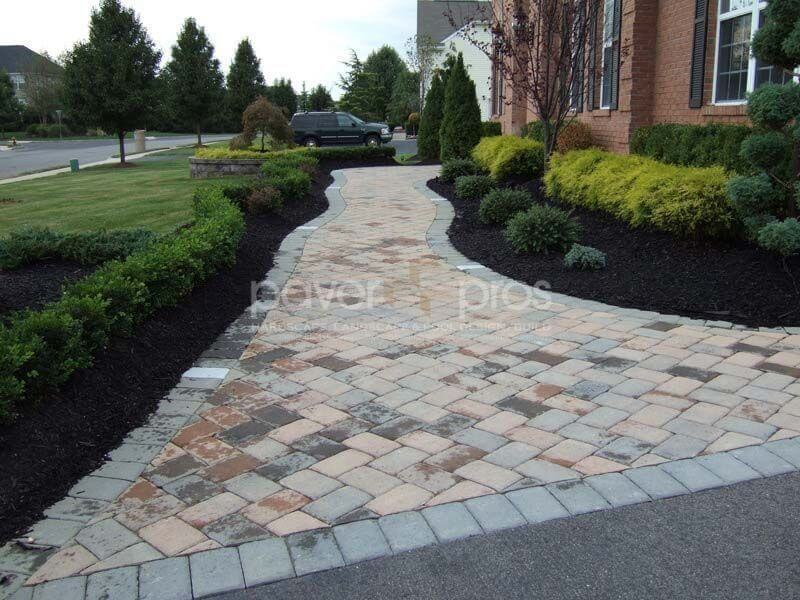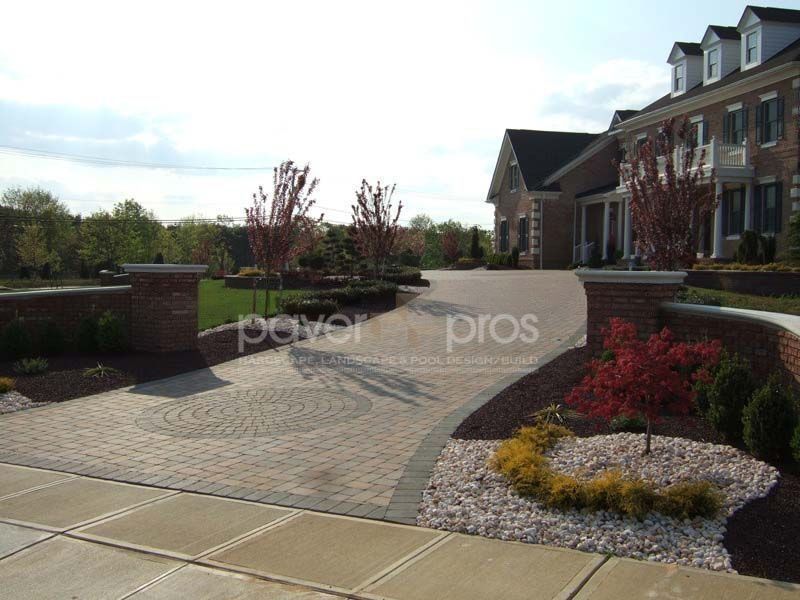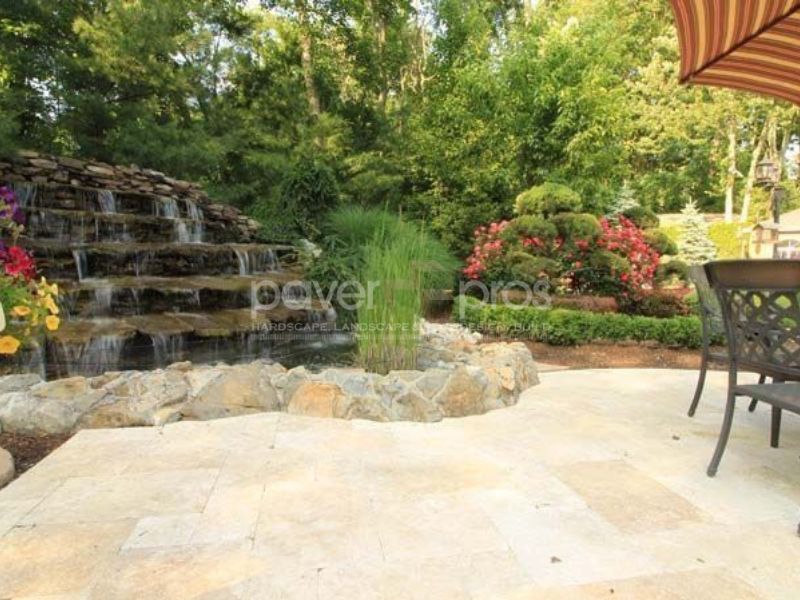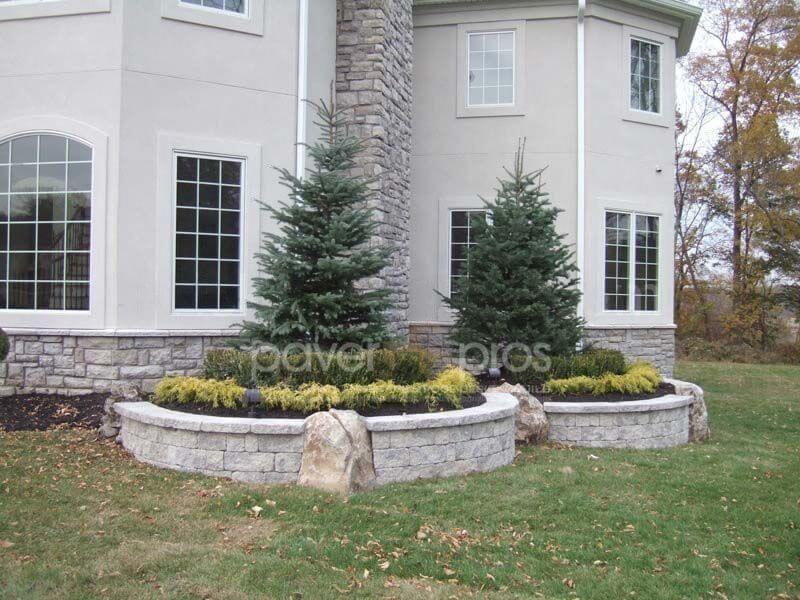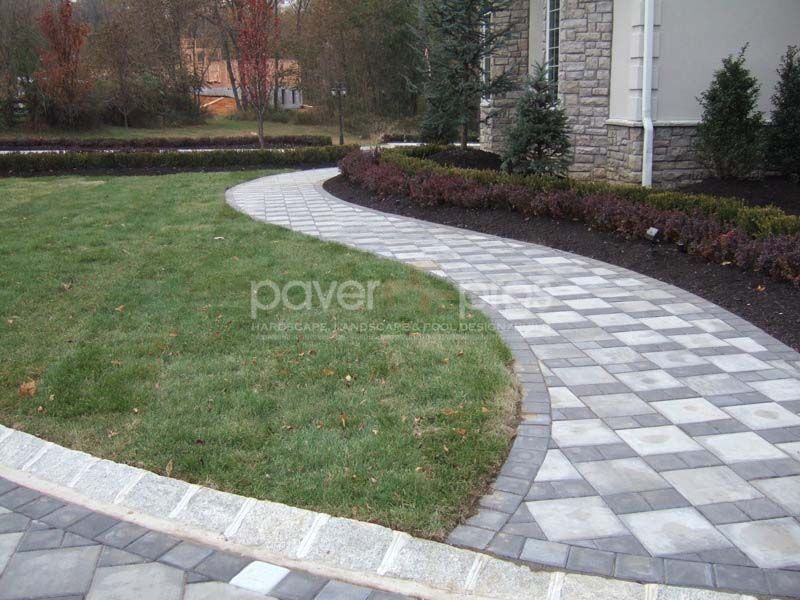Masonry
- Home
- Masonry
Many homeowners in Freehold take great pride in their homes. They thrive to create beautiful backyards and entrance ways that will make all of their neighbors jealous. Walkways and driveways are important parts of the aesthetics of the front of your home, which is why it is important to hire only the best to install them.
Freehold, NJ Driveways and Walkways
Paver Pros is a great company that will be able to create an eye catching walkway and driveway to enhance the look of the front of your home. All of the employees at Paver Pros are professionals and are very experienced in masonry and different ways of laying brick, interlocking pavers, and concrete pavers.
Using interlocking pavers and concrete pavers will ensure you receive the best masonry Freehold has to offer. This will make for a walkway, driveway, patio, or pool/spa area that needs little maintenance. In fact, the materials and techniques are resistant to damage caused by rock salt and thawing cycles. Although, the materials are resistant to damage they can sometimes undergo small issues that can be easily replaced and can be repaired without unsightly patches.
Driveway Installation in Freehold, NJ
If you are thinking of having your driveway repaved in Freehold you might also consider looking into having your driveway done by the incredible designers at Paver Pros. The professional designers will be able to create a beautiful driveway using their knowledge of brick paving and all of their specialized equipment to ensure the job is done quickly and efficiently. The professionals will be able to create a unique design, for your driveway, using a wide selection of interlocking and concrete pavers.
Paver Pros works with a few different Freehold, NJ suppliers to ensure you are given a wide selection of colors, shapes, and looks. When you call for a free consultation and quote, the designers will be able show you a portfolio full of different ideas and ways to use the materials to create a classy driveway.
Freehold, NJ Walkways and Patios
After putting in your driveway you should really consider allowing the wonderful craftsmen at Paver Pros to put in a walkway, patio area and or retaining wall. Patios and walkways are an essential part of the ideal landscape design plan, and our professionals will be able to create the wonderful walkway to make the look of the front of your home cohesive, thus making it more aesthetically pleasing. Call today to receive a free personal consultation.
Hardscape and landscaping Service Freehold NJ
We are a professional Freehold NJ hardscaping company servicing the central New Jersey area. With a considerable number of years of experience behind us and many satisfied clients after, we offer you thoroughly professional and expert services in hardscaping and landscaping for Freehold NJ.
Hardscape, in the practice of landscaping, refers to the paved areas like streets & sidewalks, large business complexes & housing developments, and other industrial areas where the upper soil profile is no longer exposed to the actual surface of the Earth in Freehold NJ. The term is especially used in heavily urbanized or suburban areas with little bare soil.
Typical small-scale hardscaping examples include patios and sidewalks. Retaining walls are often used to create boundaries between hardscapes and earth landscaping features, or softscapes. From an urban planning perspective, hardscapes can include very large features, such as paved roads and traffic circles or traffic islands. Most artificial water features are technically hardscapes because they require a barrier to retain the water, instead of letting it drain into the surrounding soil.
From an aesthetic perspective, hardscaping allows workers to erect landscaping features that would otherwise be impossible due to soil erosion, or that compensate for large amounts of human traffic that would cause wear on bare earth or grass. For example, sheer vertical features are possible.
Hardscape means any area devoted to a landscape in Freehold NJ made up of hard wearing materials such as stone, concrete and other construction materials, as opposed to soft landscaping which is grass, bark and other such items.
The term hard landscape is used by practitioners of landscape architecture and garden design to describe the construction materials which are used to improve a landscape by design. The corresponding term soft landscape materials is used to describe plant materials. A wide range of hard landscape materials can be used, such as brick, gravel, rock or stone, concrete, timber, bitumen, glass, metals, etc. ‘Hard landscape’ can also describe outdoor furniture and other landscape products.
Landscape architecture is a multi-disciplinary field, incorporating aspects of: botany, horticulture, the fine arts, architecture, industrial design, geology and the earth sciences,environmental psychology, geography, and ecology. The activities of a landscape architect can range from the creation of public parks and parkways to site planning for campuses and corporate office parks, from the design of residential estates to the design of civil infrastructure and the management of large wilderness areas or reclamation of degraded landscapes such as mines or landfills. Landscape architects work on all types of structures and external space – large or small, urban, suburban and rural, and with “hard” (built) and “soft” (planted) materials, while integrating ecological sustainability. The most valuable contribution can be made at the first stage of a project to generate ideas with technical understanding and creative flair for the design, organization, and use of spaces. The landscape architect can conceive the overall concept and prepare the master plan, from which detailed design drawings and technical specifications are prepared. They can also review proposals to authorize and supervise contracts for the construction work. Other skills include preparing design impact assessments, conducting environmental assessments and audits, and serving as an expert witness at inquiries on land use issues.
In most states, provinces, municipalities, and jurisdictions, such as Ontario, Canada and Santa Barbara, California, all designs for public space must be reviewed and approved by licensed landscape architects in Freehold NJ.
The variety of the professional tasks that landscape architects collaborate on is very broad, but some examples of project types include:
- The planning, form, scale and siting of new developments
- Civil design and public infrastructure
- Sustainable development
- Stormwater management including rain gardens, green roofs, groundwater recharge, and treatment wetlands
- Campus and site design for public institutions and government facilities
- Parks, botanical gardens, arboretums, greenways, and nature preserves
- Recreation facilities; i.e.: playgrounds, golf courses, theme parks and sports facilities
- Housing areas, industrial parks and commercial developments
- Estate and residence landscape master planning and design
- Highways, transportation structures, bridges, and transit corridors
- Urban design, town and city squares, waterfronts, pedestrian schemes, and parking lots
- Large to small urban renewal planning and design
- Natural park, tourist destination, and recreating historical landscapes, and historic garden appraisal and conservation studies
- Reservoirs, dams, power stations, reclamation of extractive industry applications or major industrial projects andmitigation
- Environmental assessment and landscape assessment, planning advice and land management proposals.
- Coastal and offshore developments and mitigation
- Ecological Design any aspect of design that minimizes environmentally destructive impacts by integrating itself with natural processes and sustainability
Landscape managers in Freehold NJ use their knowledge of landscape processes to advise on the long-term care and development of the landscape. They often work in forestry, nature conservation and agriculture.
Landscape scientists have specialist skills such as soil science, hydrology, geomorphology or botany that they relate to the practical problems of landscape work. Their projects can range from site surveys to the ecological assessment of broad areas for planning or management purposes. They may also report on the impact of development or the importance of particular species in a given area.
Pool and landscape design NJ planners are concerned with landscape planning for the location, scenic, ecological and recreational aspects of urban, rural and coastal land use. Their work is embodied in written statements of policy and strategy, and their remit includes master planning for new developments, landscape evaluations and assessments, and preparing countryside management or policy plans. Some may also apply an additional specialism such as landscape archaeology or law to the process of landscape planning.
Green roof designers design extensive and intensive roof gardens for storm water management, evapo-transpirative cooling, sustainable architecture, aesthetics, and habitat creation in Freehold NJ.
Brick paver installation Freehold NJ
We are in the business of regularly installing interlocking pavers, patio and driveway pavers etc in Freehold NJ. Each and every project undertaken by us is considered to be unique by us and is given our full commitment.
We have the perfect pavers Freehold NJ workmen and the masonry expertise to install any manufacturer’s pavers, be it brick pavers or stone pavers. We have perfected the art of laying down stones or brick pavers and our designers will work with you to create the most stunning and durable patios, walkways or driveways. Since we own all types of equipment necessary for these projects including excavation equipment, we save time and money.
An interlocking concrete paver is a type of paver. This special type of paver, also known as a segmental paver, has emerged over the last couple of decades in the United States as a very popular alternative to brick, clay or concrete in Freehold NJ.
Segmental pavers have been used for thousands of years. The Romans built roads with them that are still there. But it was not until the mid-1940s that pavers began to be produced out of concrete. It started in the Netherlands where all the roads are made to be flexible because the country is below sea level and the ground shifts, moves and sinks. Poured concrete is not an option because it will crack. Individual units not set in concrete placed in sand perform far better than concrete. Before the paver was made from concrete either realstone or a clay product had to be employed.
The first concrete pavers were shaped just like a brick, 4” by 8” (10cm x 20cm) and they were called Holland Stones and still are today. These units turned out to be far more economical to produce and were exceedingly strong.
When one thinks of interlocking paving stones in Freehold NJ one often gets the idea of dog bone shape stones that fit together like a jigsaw puzzle. That is not the case at all. The interlocking comes from the fact that each stone can not move independently from its neighbor. In fact there are two important aspects of an interlocking paving stone job that keeps the pavers interlocked.
The first is the sand. As simple as this might seem the sand creates the interlock. Not any sand though, it must be a sharp angular sand (also called Joint Sand and Polymeric Sand) that will lock together. If you filled the joints between the pavers with silica sand, each particle is perfectly round, it’s like putting ball bearing between the pavers and they will then be able to move independent of the stone next to them. Pavers are made with a small ridge on the side of each one so there is space for the sand.
As pictures show pavers being lifted. Notice the whole surface lifts, not just one paver. The fact that the whole surface moves together demonstrates the sand holding the pavers together in Freehold NJ.
The second important aspect is the edge restraints (the border that is holding the pavers together). Since they are sitting in sand not mortar if the edge is not held firmly in place they could start to spread apart. This would create larger and larger opening between the pavers that would eventually be so wide that there would no longer be friction between the stones.
With the second condition in place you have now created interlock in Freehold NJ.
Landscaping Freehold NJ
Once the Freehold NJ hardscape is finalized we can help with garden landscaping which is also within our specialization. We have experienced Freehold NJ landscape designers who have the knowledge to design and install plants to complement your overall landscape. Your landscape can be enhanced with the addition of ponds or rock waterfalls or fountains; we are fully equipped to carry out any design process.
In the start, the Freehold NJ landscaping contractor makes a letter which is a rough design and layout of what could be done with the land in order to achieve the desired outcome. Different pencils are required to make graphics of the picture. Landscaping has become more technological then natural as only few projects begin without bulldozer, lawnmowers andchainsaw. It is estimated that 40 million lawnmowers consume approximately 200 million gallons of gasoline annually. Different areas have different qualities of plants.Fertilizers are required for this purpose in excess amounts as natural landscaping is done. Some landscapers prefer to use Mix gravel with rocks of varying sizes to add interest in large areas.
Landscape Contracting is: “a profession that involves the art and technology of landscape and garden project planning,construction and landscape management, and maintenance and gardening; for garden aesthetics, human enjoyment and safety, and ecosystem–plant community sustainability.”
Landscape contracting is a licensed profession in many jurisdictions in the United States, such as Freehold NJ, with requirements varying, but including a combination of formal education, work experience and/or apprenticeship of a certain time length, technical testing, posting a bond, and periodic renewal submittals. Landscape Contracting Associations offer ongoing education, specialty skills certifications, and recognition of outstanding professional accomplishments in Freehold NJ.
Landscape contractors in Freehold NJ work in collaboration with clients, landscape designers, landscape architects, garden designers, architects, general contractors, artisans, specialty construction trades, plant nursery growers, and municipal building inspectors, and trade supply stores and manufacturers.
Pools and Patios Freehold NJ
We can help give a totally new look to your Freehold NJ pool side by either upgrading your pool landscape or going in for complete renovation, if so desired. A few cleverly placed accents here and there or a newly paved walkway leading to the pool side can work miracles and at minimum costs in Freehold NJ.
From design to construction, we take care of it all and at very competitive rates. We do not believe in inflating our prices to make a quick buck. We are not looking at short-term gains but at long-standing relationships with our clients based on mutual trust. To this effect we strive to do our best and it is always our endeavor to keep alive the trust reposed in us.
We do not step out of the Freehold NJ parameters laid down by you concerning designing or budgeting unless it is with your express consent. We respect your time as well as ours and our projects do not take more time than necessary. Our crew is vouched for not only but ourselves but also by our satisfied customers, whose testimonials you are welcome to see. We are not into slipshod work or hastily-competed jobs. Whatever we undertake is finished to your satisfaction and ours.
Open communication, timely completion of projects and personal integrity are the hallmarks of our company and we would like the opportunity to be of service to you in any of your hardscaping or landscaping projects. Thank you for taking out the time to visit us.
A patio (/ˈpæti.oʊ/, from Spanish: patio [ˈpatjo]; “courtyard”, “forecourt”, “yard”) is an outdoor space generally used for dining or recreation that adjoins a residence and is typically paved. It may refer to a roofless inner courtyard of the sort found in Spanish-style dwellings or a paved area between a residence and a garden.
Patios are most commonly constructed from paving slabs (also known as paving flags) in Freehold NJ. There are two main types of paving slab; concrete or stone. Concrete slabs are cheaper than their natural stone counterparts. This is because the cost of production is far lower. Concrete slabs are produced solely within a manufacturing plant unlike natural stone which is extracted from quarries.
As well as paving slabs, patios can also be created using other durable surfaces such as bricks, block paving, tile, concrete, natural paving stones or cobbles.
Freehold NJ landscaping design professionals
When you want the best in Freehold NJ landscape design, hire a team of professionals to do an impeccable job of making your landscape look beautiful. They have over 20 years experience doing landscape design, masonry, and more. They believe in providing three things: dependability, experience, and quality. A professional team of landscapers are committed to providing excellent customer service, doing the job on time and on budget, and always providing quality work that stands apart from the rest in Freehold NJ. With results and experience to back them up, they have become the leaders in New Jersey landscape design.
The next time you want your yard to be the best on the block, hire the professional team of Freehold NJ landscapers to do the job right for you. They will cut and trim your lawn to perfection, while adding beautiful plants, trees, and shrubs to add beauty and elegance to your property. Plus, if you need masonry work done on your property, they are experts at doing that as well. They will do a professional job on all your rockwork needs. Whether you want to put up a large wall for privacy in Freehold NJ or simply add some masonry to your flower beds, you can count on the professional New Jersey landscapers to do the work for you.
If you’re considering adding an inground pool to your property, then the New Jersey professionals can also do this job for you within your budget in Freehold NJ. They know how to put in a beautiful pool that will add beauty and value to your home. They also know that your family wants to use the pool on a daily basis, so they will make sure they make it to last. You can even ask them about putting an outdoor BBQ by the pool for entertaining during the summer months.
Hire a team for landscape design that you can feel good about; talk to the professionals in Freehold NJ today and ask them how they can make your yard and property look more beautiful than it ever has before. Now is the time to make your vision a reality; call or go online and talk to the experts right away. They will answer all your questions and give you a quote right on the spot. You will love their work, but more importantly, you will love how beautiful and immaculate your yard looks. Isn’t it time to have the home of your dreams?
Landscaping refers to any activity that modifies the visible features of an area of land, including:
- living elements, such as flora or fauna; or what is commonly known to as gardening, the art and craft of growing plants with a goal of creating a beautiful environment within the landscape.
- natural elements such as landforms, terrain shape and elevation, or bodies of water;
- human elements such as structures, buildings, fences or other material objects created and/or installed by humans; and
- abstract elements such as the weather and lighting conditions.
Landscaping is both science and art, and requires good observation and design skills in Freehold NJ. A good landscaper understands the elements of nature and construction and blends them accordingly.
Freehold NJ Landscaping requires study and observation. It is not the same in different parts of the world. Landscaping varies according to different regions. Therefore normally local natural experts are recommended if it is done for the first time. Understanding of the site is one of the chief essentials for successful landscaping. Different natural features like terrain, topography, soil qualities, prevailing winds, depth of the frost line, and the system of native flora and fauna must be taken into account. Sometimes the land is not fit for landscaping. In order to landscape it, the land must be reshaped. This reshaping of land is called grading.
Removing of earth from the land is called cutting while when earth is added to slope, it is called filling. Sometimes Freehold NJ grading process may involve removing of excessive waste, soil and rocks, so designers should take into account while at planning stage.
Interlocking Pavers Installation Freehold NJ
Over the years we have established ourselves as perfect pavers Freehold NJ. Our forte is installing any type of pavers whether it is simple brick paver or interlocking concrete pavers or interlocking paving stones. We have done it all and when we take on a project we bring with us years of experience and we can advise you on the type of paving most suited to your landscaping design.
We are involved right from the conceptual stage to the finishing stage and we leave no stones unturned to deliver the best. We are a fully certified member of the Interlocking Concrete Pavement Institute the leading authority on paving installation, so you are rest assured that we’ll get the job done quickly and professionally in Freehold NJ.
Whatever your project is, we can do it. The reputation which we enjoy is the result of years of hard work and uncompromising attention to quality and workmanship. You can expect the highest level of dedication from our team of professionals who will only be too happy to help you take your Freehold NJ dream forward.
No Freehold NJ job is too small or too big for us; unwavering consideration is given to each and every type of job. Just the small lead to the poolside needs to be paved over? No problem, we will take it on. Conversely, if your entire landscape requires an overhaul, you have come to the right place, for we have the expertise on patio pavers as well as landscaping designs. We can suggest ways and means to highlight certain portions of your landscape with pavers like stone pavers or interlock concrete pavers for your driveway or the walkway or the patio.
Interlocking paver blocks are all the rage now in Freehold NJ and it’s designing and installation is something which we have perfected over the course of countless residential and commercial installations. Interlocking driveway pavers enhance the looks and value of your Freehold NJ home, are affordable and won’t crack, sag, shift or separate, if installed properly. In fact, it can last for generations with a little care. Plus we offer a wide variety of patterns and colors to choose from. During your free consultation you will see a portfolio filled with different designs and styles. Feel free to browse some Freehold NJ examples on the portfolio tab. Besides that our designers will help you find the perfect match for your project. Providing elegance and durability, pavers lend an old-world charm and with our professional installation by our skilled employees you’ll be delight you for years to come. Paver Pros offers competitive rates, high degree of quality and skilled professionals who not only know their jobs but are unfailingly courteous and open to your suggestions and inputs. With Paver Pros on your Freehold NJ project, be rest assured you are in good hands, if the numerous testimonials are any indication. We strive for excellence and no job is considered finished till you are satisfied.
Learn More About Interlocking Pavers
Paver blocks are the recommended material to enhance the looks and value of your Freehold NJ home with regards to walkways, patios and driveways.
Benefits of Concrete Pavers
Pavers wont crack like asphalt or poured-in-place concrete – Each unit has joints that allow for a small amount of movement without cracking.
Easy to repair – Remove and reinstate the same pavers with no ugly patches after repairs to the base or Freehold NJ underground utilities. Asphalt, concrete, and stamped concrete can’t make this claim.
Resists deterioration from freeze – thaw cycles and deicing salts better than asphalt and better than ordinary poured-in-place concrete.
Snow removal is the same as with other pavements just shovel or use a snow blower.
Many shapes and colors – Suppliers stock rustic stone-like pavers to those that look like clay brick. Light colored pavers offer a cooler surface around patios and pool decks.
During your free consultation with Tom, you will see a portfolio filled with different designs and styles for Freehold NJ. Feel free to browse some examples on the portfolio tab.
Interlocking pavers are manufactured by machinery in factories for Freehold NJ. They consist of both fine and coarsely grained aggregate, along with cement compounds. The ingredients are put through pressure and vibration courses, which produce a strong, durable concrete that can then be molded into various shapes and designs.
Manufacturing of Freehold NJ pavers is done on two types of machines in general. The first being more popular, more productive, cost effective, yielding high strength product is through block making machines. The movements are controlled through hydraulics and the compaction is done through eccentric weight vibrators. An aggregate mix of sand, rock, and cement. The mixture is then poured into a mold called “the shoes”. The mixture is then hammered into the mold using several thousand pounds of pressure from the eccentric weight vibrators. They are typically then tested to make sure that the water to mixture ration is correct. Following this, the pavers go through a curing process that can last eighteen to twenty hours. The curing process and additional processes can vary based on the style of paver. The other choice is of hydraulic press machines that deny each of the above mentioned advantages still common in few countries because of their low capital demand. There is no vibration to move the material in the mold; thus voids may remain present.
Patio Pavers Installation Freehold NJ
Our patio pavers installation is expertly handled and if due to any normal wear and tear, the pavers need to be replaced our Freehold NJ maintenance crew is here at your service. Patio Pavers are our specialty and the assurance of a well-executed project is our guarantee.
Interlocking concrete pavements are a special dry mix pre-cast piece of concrete commonly used in exterior hardscaping pavement applications. Unit Pavements or block paving, nicknamed concrete pavements in the United States were developed before the Second World War by the Dutch and introduced into the United States in the early 1970s.
Interlocking paving stones are installed over a compacted stone sub-base and a leveling bed of sand in Freehold NJ. Concrete paving stones can be used for walkways, patios, pool decks and driveways and airport or loading docks.
Instead of connecting the pavers by pouring grout between the joints as one would with tiles, sand particles are spread over the pavers and tamped down. The sand stabilizes the interlocking pavers, yet allows for some flexibility. This type of pavement will absorb stress such as small earthquakes, freezes and thaws, and slight ground erosion by flexing. Therefore, they do not easily crack, break or buckle like poured asphalt or poured concrete.
Some of the special tools needed for installing interlocking pavers are vibrating compaction machine or “Vibra Plate” and Shear Cutter. The former is used to compact the base material to 90% density minimum and also to set and interlock the pavers into the Freehold NJ sand bed. The latter is used to cut the pieces to fit at corners and edges. The sand does not easily wash out with rain or garden hose water. Polymeric Sand or a sealant can be used to further lock or coagulate the sand. There are many other tools involved in preparing sub-grade, base materials, sand bed and installing unit pavements correctly in Freehold NJ.
Standard thicknesses are 60 mm (for light traffic) and 80 mm (heavy traffic). 50 mm too is common in some countries like Pakistan (used for footpaths etc.).
Benefits of paver over asphalt and poured concrete include high compressive strengths (7000+psi as per BS and 8000+psi with no more than 5% absorption as per ASTM codes and as high as 19,000+psi depending on manufacturer and type of unit pavement), pleasant look, time saving, easy removal and relaying.
Paving has been around for almost 5,000 years. One of the oldest paved roads was discovered in the summer of 1994, in Giza, Egypt. This road was built over 4,600 years ago as a route to connect an ancient basalt quarry to Lake Moeris and used to transport large stones for the construction of the temples of Giza. This ancient road measures 7 1⁄2 miles (12.1 km) in length and 6 1⁄2 feet (2.0 m) in width. The road was paved with thousands of slabs of sandstone and limestone and some logs of petrified wood. The still standing road was used to carry massive stones using sleds and proved to be reliable.
In 500 B.C., during the Roman Republic, Rome introduced the segmental pavers in their road system. The Romans needed their armies to travel quickly within the empire and the current kinds of roads posed many problems. The roads were often muddy, created too much drag, and also created lots of dust in heavily transited areas. To solve that problem the Romans created roads with deep roadbeds of crushed stone and a top layer that included six sided capstones. The Roman roads provided the troops with much faster transportation and proved to be reliable as they still stand to this day.
Over time many roads were built and paved based on the Roman road design and natural stones and clay were used to pave the roads up until the 18th century. At that point, British builders realized the importance of selecting clean stones for surfacing to make better roads. The selection of clean stones made road paving a bit costly until later on when concrete pavers could be manufactured. Most of these roads provided a means of fast transportation with the use of horse-drawn carriages.
In the 1940s Holland faced a problem with its roads because Holland is situated below sea level, therefore the ground constantly shifts, moves and sinks. Poured concrete was not an option because it is not flexible and would strain and crack. Therefore, Holland turned to the use of individual stones placed in sand, which provided a flexible yet durable road that would not be affected by shifts and movements of the ground.
After World War II, most of Europe was in ruin and reconstruction began. The roads where rebuilt using paving stones as they have historically proved to be able to withstand certain demands that concrete and asphalt could not meet. German engineer, Fritz Von Langsdorff developed a choice of shapes and introduced the use of colors in concrete pavers. Historically pavers where often made of natural stone or clay, but the introduction of concrete paving stones turned out to be more economical to produce and had tremendous pressure resistance. The first concrete paving stones where installed in Stuttgart, Germany.
Interlocking concrete pavers are now an efficient and economical choice as mass production started in the 1960s in Germany. In the 1970s production technology spread through Europe and other parts of the world including the United States. Since then America has seen a significant growth of concrete interlocking pavers and has been growing steadily. Still to this day Europe has approximately 8 square feet per person installed, compared to less than 1 square foot per person in the United States.
Custom Masonry Stone Installation Freehold NJ
We are a full-service hardscaping company providing quality masonry service to residential and commercial clients in the Freehold NJ area. From the simplest fire place and fire pit to an extraordinary stone veneer, from natural pools and streams to contemporary brick veneer, our designers will work with you to create the most stunning and durable landscape motifs, including modern, contemporary, and traditional. Since we own all types of equipment necessary for these projects including excavation equipment, we save time and money for Freehold NJ residents.
Masonry is the building of structures from individual units laid in and bound together by mortar; the term masonry can also refer to the units themselves. The common materials of masonry construction are brick, stone, marble, granite,travertine, limestone, cast stone, concrete block, glass block, stucco, tile, and cob. Masonry is generally a highly durable form of construction. However, the materials used, the quality of the mortar and workmanship, and the pattern in which the units are assembled can significantly affect the durability of the overall masonry construction.
Masonry is commonly used for the walls of buildings, retaining walls and buildings. Brick and concrete block are the most common types of masonry in use in industrialized nations and may be either weight-bearing or a veneer. Concrete blocks, especially those with hollow cores, offer various possibilities in masonry construction. They generally provide great compressive strength, and are best suited to structures with light transverse loading when the cores remain unfilled. Filling some or all of the cores with concrete or concrete with steel reinforcement (typically rebar) offers much greater tensile and lateral strength to structures.
Advantages
- The use of material such as bricks and stones can increase the thermal mass of a building and can protect the building from fire.
- Most types of masonry typically will not require painting and so can provide a structure with reduced life-cycle costs.
- Masonry is non-combustible product.
- Masonry walls are more resistant to projectiles, such as debris from hurricanes or tornadoes.
- Masonry structures built in compression preferably with lime mortar can have a useful life of more than 500 years as compared to 30 to 100 for structures of steel or reinforced concrete.[citation needed]
Disadvantages
- Extreme weather -combined with the right circumstances- can cause degradation of masonry wall surfaces due to frost damage.
- Masonry tends to be heavy and must be built upon a strong foundation, such as reinforced concrete, to avoid settling and cracking.
- Save for concrete, masonry construction does not lend itself well to mechanization, and requires more skilled labor than stick-framing.
Structural limitations
Masonry boasts an impressive compressive strength (vertical loads) but is much lower in tensile strength (twisting or stretching) unless reinforced in Freehold NJ. The tensile strength of masonry walls can be strengthened by thickening the wall, or by building masonry piers (vertical columns or ribs) at intervals. Where practical, steel reinforcements can be added.
Backyard Renovation Service Freehold NJ
Turn that shabby Freehold NJ backyard into a garden oasis – we design patios, pool decks, driveways, walkways and retaining walls..
As professional hardscapers, we install retaining walls, concrete pavers, travertine pavers, brick, stucco and cultured stone everyday. Currently in the central New Jersey area, we are committed to doing the finest work at the fairest rate.
We can install any manufacturer’s pavers and walls. We also install natural travertine and marble pavers and pool copings from South America and Turkey. We can also design and install your outside bar area, grill area, outside fireplace, fence pillars and entry stanchions.
A back yard (or backyard) is a yard at the back of a house, common in suburban developments in the Western world.
In cold-weather regions, it is economical in low land value regions to use open land surrounding a house for vegetable gardening during summers and allowing strongly demanded sunlight to enter house windows from a low horizon angle during winters. As land value increases, houses are built nearer to each other. In order to preserve some of the open land, house owners may choose to allow construction on the side land of their houses, but not build in front of or behind their house in order to preserve some remnants of open surrounding land. The back area is known as the back yard. The front area is known as the front yard.
Depending on the size of the back yard, it may have any number of items (or none), such as:
- Barbecue
- Buildings such as: barn, chicken coop, garage, gazebo, guest house, outhouse, playhouse, sauna, shed, smokehouse, workshop, etc.
- Compost bin
- Decking
- Fencing
- Garden
- Garden furniture (bench, patio table and chairs, umbrella, etc.)
- Landscaping with or without a lawn or just dirt
- Renewable energy generator (solar panels, windmills, etc)
- Playground equipment (sandbox, slide, swingset, etc)
- Storage tank
- Swimming pool and/or hot tub
- Vehicle
- Waste container
Water gardens, also known as aquatic gardens, are a type of man-made water feature. A water garden is defined as any interior or exterior landscape or architectural element whose primarily purpose is to house, display, or propagate a particular species or variety of aquatic plant. Although a water garden’s primary focus is on plants, they will sometimes also house ornamental fish, in which case the feature will be a fish pond.
Although water gardens can be almost any size or depth, they are typically small and relatively shallow, generally less than twenty inches in depth. This is because most aquatic plants are depth sensitive and require a specific water depth in order to thrive. The particular species inhabiting each water garden will ultimately determine the actual surface area and depth required.
Inground Swimming Pools Design and Renovate Freehold NJ
Welcome to Paver Pros and Fencing LLC, where we combine over three decades of pool renovating experience and over a decade of total backyard solutions in Freehold NJ. Our luxury in-ground Gunite swimming pools are of the highest quality in New Jersey. With personalized service, creative designs, and superior materials, Paver Pros will create a very high quality custom pool, and at a very competitive rate to other pool renovating companies.
When starting fresh with a brand new custom luxury pool, Paver Pros will help you complete your design vision with a professional skill and dedication that can’t be matched. The finest materials available will always be used so that the finished product is top-quality; this is what we strive for. Our superior Gunite pools are very durable and can be creatively styled however you desire. We work with you to meet your individual needs; you can add stylish accents like benches and lighting to your luxury pool, and your pool landscape can be enhanced with elegant features such as waterfalls, fountains, slides and walkways. Our designs are unique and innovative, and you can be sure that our experienced workmen will expertly coordinate construction for your cement pool, as well as hardscape and landscape. Paver Pros also offers warrantees after the pool’s completion.
Your luxury swimming pool will make an impressive outdoor environment for entertaining, or simply a sophisticated leisure area to relax, where your family can spend more time together. A beautiful and luxurious backyard will also compliment the overall look of your home. Begin with a free consultation, and let us help you create your dream custom pool exactly how you envision it, with high quality materials, and an attention to detail that will make for a gorgeous pool. One call will give you a total custom backyard vacation, without the travel.
Please browse through the following pictures of some gorgeous pools that we have built.
We are proud to be a part of the Carecraft Organization.
We are members of the APSP.
We are members of the NESPA.
We are members of the BBB.
We are members of the NJ Chamber of Commerce.
A swimming pool, swimming bath, wading pool, paddling pool, or simply a pool, is a container filled with water intended for swimming or water-based recreation. There are many standard sizes, the largest of which is the Olympic-size swimming pool. A pool can be built either above or in the ground, and from materials such as concrete (also known as gunite), metal, plastic or fiberglass.
Pools that may be used by many people or by the general public are called public, while pools used exclusively by a few people or in a Freehold NJ home are called private. Many health clubs such as the YMCA, fitness centers and private clubs have public pools used mostly for exercise. Many hotels have pools available for their guests. Educational facilities such as schools and universities occasionally have pools for swimming or physical education classes, or competitive athletics such as swim team. Hot tubs and spas are pools with hot water, used for relaxation or therapy, and are common in homes, hotels, clubs and Freehold NJ massage parlors. Swimming pools are also used for diving and other water sports, as well as for the training of lifeguards and astronauts.
Tennis Courts Construction Freehold NJ
At Paver Pros, we take pride in our Freehold NJ work. Paver Pros provides an ELITE quality of tennis court installation in the central New Jersey area. Our expertise and craftsmanship is beyond compare. Paver Pros uses only the highest quality materials to make sure our customers receive only the highest quality tennis court installation in Freehold NJ. Paver Pros’ team of tennis court contractors will ONLY provide you with professional, courteous service and quality workmanship in the central New Jersey area.
Substrates for hard tennis courts are either asphalt or concrete in Freehold NJ. Asphalt has a lower initial cost of installation, but will begin to deteriorate quickly. At five years structural cracks have developed or are developing, as well as birdbaths (depressions in the asphalt). At 20 years major restoration work is required. Concrete can either be reinforced or post-tensioned. Reinforced concrete courts are recommended to be 5″ thick with #4 rebar placed 12″ on center, both directions. Each ½ court should be cast at one time, with no intervening joints. With no jointing, expect random cracking to occur, but due to the rebar, they will open only minimally. Post-tensioned concrete utilizes steel cables in a plastic sheathing, which are placed in a grid through out the slab. A minimum of one full-court is placed at one time, and the cables are stressed to 33,000 psi once the concrete has reached a minimum strength of 2,700 psi (typically 5 to 7 days). Although random cracking is likely to occur, the cable compression will keep them to a hairline crack and not allow displacement. This is the most structurally sound method of construction. Substrates for clay courts should be properly compacted road base or non-expansive native soils. For Sand-Filled Turf courts, asphalt or concrete is recommended, although they can be constructed on properly prepared road base materials.
What kinds of surfaces are available?
Acrylic color coatings are standard hard court surfaces. These are comprised of resurfacer coats for blending/smoothing and color coats for texture and aesthetics. Cushioned surfaces are installed on hard-court substrates, such as concrete or asphalt. The cushioned surface can either be an acrylic-and-rubber build up system or a textile product. There are several options for each type of cushioned surface, all with varying degrees of cushion. Sand-filled Turf surfaces can be installed on either concrete, asphalt or a properly prepared gravel base. These surfaces are finding a niche in the industry as a rehabilitative surface, being placed over severely cracked substrates. There are several manufacturers of these surfaces, each with certain attributes. Har-Tru Clay surfaces are comprised of aggregate bases, with crushed granite as the actual play surface. Most installations are new facilities, although it is becoming more common to rebuild existing facilities by overlaying the existing courts with a clay court system.
A tennis court is where the game of tennis is played. It is a firm rectangular surface with a low net stretched across the center. The same surface can be used to play both doubles and singles.
Tennis is played on a rectangular flat surface, usually of grass, clay, concrete (hard court) or a synthetic suspended court. The dimensions of a tennis court are defined and regulated by the International Tennis Federation (ITF) governing body and are written down in the annual ‘Rules of Tennis’ document. The court is 23.78 meters (78 feet) long, 10.97 meters (36 feet) wide. Its width is 8.23 meters (27 feet) for singles matches and 10.97 meters (36 feet) for doubles matches. The service line is 6.40 meters (21 feet) from the net. Additional clear space around the court is needed in order for players to reach overrun balls for a total of 18.3 meters (60 feet) wide and 36.7 meters (120 feet) long. A net is stretched across the full width of the court, parallel with the baselines, dividing it into two equal ends. The net is 1.07 meters (3 feet 6 inches) high at the posts, and 0.914 meters (3 feet) high in the center. The net posts are 3 feet (0.914 m) outside the doubles court on each side or, for a singles net, 3 feet (0.914 m) outside the singles court on each side.
Our Video Gallery
Our Gallery
Client Testimonials.
